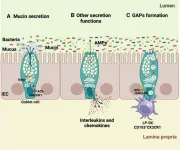(Press-News.org) COLUMBUS, Ohio – Suicide remains a pressing public health concern. An estimated 703,000 people die by suicide each year worldwide, according to The World Health Organization. In 2022, there were 49,449 suicides in the United States.
A new study found that brief cognitive behavioral therapy for suicide prevention – when delivered remotely via video telehealth – reduces suicide attempts and suicidal ideation.
Researchers at The Ohio State University Wexner Medical Center and College of Medicine led the study that is published online in the journal JAMA Network Open.
The randomized clinical trial of 96 U.S. adults with recent suicidal ideation and/or suicidal behavior found that mental health therapists can see high-risk suicidal patients virtually both safely and effectively.
Brief cognitive behavioral therapy is a treatment that has been shown to reduce suicide attempts by as much as 60% when compared to typical mental health care.
However, delivering this treatment remotely via video telehealth had never been tested. Until now.
The study was conducted between 2021 and 2023, during the height of the COVID-19 global pandemic.
“The impetus for this research question was the nearly overnight shift from mostly in-person to mostly virtual therapy appointments following the onset of the COVID-19 pandemic. Historically, high risk patients were considered inappropriate candidates for virtual healthcare, due to risk and liability concerns,” said principal investigator and Ohio State clinical psychologist Justin C. Baker, PhD.
“We wanted a way to ensure that those who needed care the most were able to receive care during the pandemic,” said Baker, who is the clinical director of Ohio State’s Suicide and Trauma Reduction Initiative (STRIVE) program.
Participants received one of these therapies:
brief cognitive behavioral therapy, a suicide-focused treatment that teaches patients how to manage and change distressing emotions and negative thinking
present-centered therapy, a goal-oriented treatment that helps participants identify adaptive responses to stressors
The study also showed that brief cognitive behavioral therapy led to significant reductions in suicide attempts when compared to present-centered therapy. Reductions in suicidal ideation occurred in both treatments.
Prior effectiveness trials have compared brief cognitive behavioral therapy to typical care, whereas this study compared it to another intervention that has been shown to reduce depression and suicidal thoughts, which is a higher comparison metric, Baker said.
This study provides critical insight into which kinds of treatments are most likely to lead to improved outcomes for those struggling with suicide. It also adds support to the effectiveness of this therapy for reducing suicidal behaviors.
“For those suffering with suicidal thoughts and behaviors, we have good, tested treatments that will lead to significant symptom reduction and improved quality of life,” said study co-investigator Craig Bryan, PsyD, professor in Ohio State’s Department of Psychiatry and Behavioral Health and director of its Suicide Prevention Program.
“Even with lessening restrictions, many therapists are keeping a portion of their telehealth practice post pandemic. This study has the potential to increase access to needed evidence-based treatments for those in rural and hard-to-reach areas,” said Bryan, who holds the Trott Gebhardt Philips endowed professorship.
Funding:
Research reported in this publication was supported in part by a charitable gift from 33 Forever. The content is solely the responsibility of the authors and does not necessarily represent the official views of 33 Forever.
Conflict of Interest Disclosures:
Justin Baker reported grants from the Department of Defense during the conduct of the study and personal fees from Anduril LLC outside the submitted work.
Craig Bryan reported grants from the Department of Defense, the National Institute of Mental Health, the New Jersey Gun Violence Research Center, and the American Foundation for Suicide Prevention during the conduct of the study and personal fees from Oui Therapeutics outside the submitted work.
AnnaBelle Bryan reported personal fees from Oui Therapeutics outside the submitted work.
Samantha Daruwala, PhD, reported a grant from the New Jersey Gun Violence Research Center during the conduct of the study.
Christina Rose Bauder, PhD, reported grants from the Department of Defense during the conduct of the study and personal fees from Anduril LLC outside the submitted work.
Lauren Khazem, PhD, reported a grant from the American Foundation for Suicide Prevention during the conduct of this study and personal fees from Anduril LLC outside the submitted work.
All other authors report no conflicts of interest.
If you or someone you know is struggling with thoughts of suicide, call or text the Suicide and Crisis Lifeline at 988.
###
END
Researchers from the Mattiroli group have found that the way DNA is packaged in cells can directly impact how fast DNA itself is copied during cell division. They discovered that DNA packaging sends signals through an unusual pathway, affecting the cell’s ability to divide and grow. This opens up new doors to study how the copying of the DNA and its packaging are linked. These findings, published in Molecular Cell, may help scientists to find therapies and medicines for diseases such as cancer in the future.
Chromatin as a guide
Every day, our cells divide. Each time they need to copy both their DNA and the structure in which the DNA is packed. This packaging, ...
Seawater electrolysis has long been seen as a promising pathway for sustainable hydrogen production but has faced significant limitations due to chloride ion (Cl⁻) corrosion, which can degrade a catalyst's performance.
Now scientists from the Qingdao Institute of Bioenergy and Bioprocess Technology (QIBEBT) of the Chinese Academy of Sciences, along with their collaborators, have developed an efficient electrocatalyst called Co-N/S-HCS that demonstrates remarkable activity and stability in ...
LOS ANGELES — Researchers at City of Hope®, one of the largest and most advanced cancer research and treatment organizations in the United States, ranked among the nation’s top 5 cancer centers by U.S. News & World Report and a national leader in providing cancer patients with best-in-class, integrated supportive care programs, now understand why taking an investigational white button mushroom supplement shows promise in slowing and even preventing prostate cancer from spreading among men who joined ...
November 12, 2024—(BRONX, NY)— Marina Konopleva, M.D., Ph.D., director of the Leukemia Program and co-director of the Blood Cancer Institute at the National Cancer Institute-designated Montefiore Einstein Comprehensive Cancer Center (MECCC), has joined forces with Break Through Cancer, a collaborative medical research foundation that supports teams of scientists as they advance treatments for some of the world’s deadliest cancers. Dr. Konopleva will play a pivotal role in the Eradicating Minimal Residual Disease (MRD) in Acute ...
Patients with a small cranial nerve tumor that can cause hearing loss, vertigo, imbalance and ringing in the ears have typically been watched rather than proactively treated, as the risks of early intervention were thought to outweigh the benefits. However, even those patients benefit significantly from non-invasive stereotactic radiosurgery, a multicenter, international study led by UVA Health physicians has found.
Doctors typically treat larger forms of the tumors, called vestibular schwannomas, while taking a “watch and wait” approach ...
Washington, November 12, 2024—As student absenteeism reaches record highs in schools across the United States, new research finds that student absences are linked to lower teacher job satisfaction, raising concerns that this may exacerbate growing teacher shortages. The findings were published today in Educational Researcher, a peer-reviewed journal of the American Educational Research Association.
The study, by Michael Gottfried and Colby Woods at the University of Pennsylvania, and Arya Ansari at The Ohio State University, is the first ...
(WASHINGTON, November 12, 2024) – Continuous enrollment in Medicaid was associated with a lower rate of a late-stage lymphoma diagnosis in children and adolescents/young adults (AYAs). However, fewer than half of Medicaid-insured patients in these age ranges were continuously enrolled before diagnosis, according to a study published today in Blood Advances.
Lymphoma – which is divided into two types, Hodgkin lymphoma (HL) and non-Hodgkin lymphoma (NHL) – is a cancer of the lymphatic system and ...
If knowledge is power, empowering the world with the art and science of negotiation offers even more far-reaching benefits – a more peaceful and prosperous world, according to the INSEAD Negotiation and Conflict Management Collaborative (NCMC).
The Negotiation Course for the World (NCW) is a pioneering effort by the NCMC to make quality negotiation teaching materials and expertise accessible to all, and in so doing, democratise negotiation education. “It is an integral part of the NCMC’s mandate to bring scholars and practitioners together to collaborate on research and education on negotiation and conflict management,” said Roderick Swaab, Professor ...
By Benjamin Boettner
(BOSTON) — Ovarian cancer is more deadly than any other type of female reproductive organ cancer. It is estimated that in 2024, in the U.S. alone, more than 12,000 women will die from the disease because available therapies are not effective. To help overcome this striking deficit in women’s health, ARPA-H has selected a team at the Wyss Institute at Harvard University as an awardee of its Sprint for Women’s Health effort to develop “iNodes” – implantable lymphoid organs containing patients’ immune cells – as an entirely novel form of personalized immunotherapy to treat ovarian ...
In a recent study, researchers at the University of California, San Diego, have provided new insights into the central role of goblet cells—specialized cells that line the gut—in maintaining a healthy and balanced immune environment within the gastrointestinal (GI) tract. Led by Dr Fernanda Raya Tonetti, with Dr. Cristina Llorente directing the project and making significant contributions, the study underscores the critical roles of these cells, which act not only as a physical barrier but also ...







